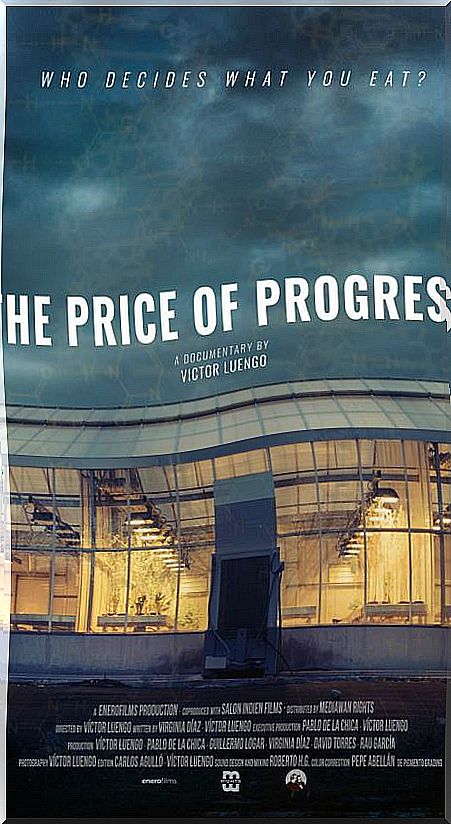The Food Lobbies Exposed
The new documentary ‘The price of Progress’ denounces how large corporations move the strings in the food sector by prioritizing their economic interests over consumer health.

We live in a world where the agri-food industry does not want any type of regulation. You are only interested in selling your products at a reasonable price. And public health is not the priority, neither of the industry nor of food agencies such as EFSA, in Europe, or the FDA, in the US.
This is the premise for the documentary The price of progress, which is being screened this weekend in Madrid at the V edition of the Another Way Film Festival, in its film cycle for sustainable progress.
The film states that citizens must react: we must demand transparency in the face of the action of lobbies, since they do everything possible to pressure and delay regulations that could protect us from many of the toxins present in food.
The price of progress: food as a commodity
Agribusiness is accused of making money unifying crops to import and export them through large corporations. It does not only produce food to feed people, but for other uses: textiles, animal feed, fibers, fuels …
In addition, modern agriculture is now in the hands of these large corporations, who have insider information on crops thanks to the use of satellites. That gives them enormous power over the entire food industry.
Treating food as a global commodity and selling it to the highest bidder only poses problems. That is why they defend in The price of progress, by director Víctor Luengo, that “food should only be food.”
GMOs are not the solution
The seed companies of GMOs (genetically modified organisms) are part of the technified industrial agriculture based on monocultures, and they have not managed to end hunger as they promised. They have acquired greater market power by introducing their seeds, for example Bayer-Monsanto, Basf, Dupont …
The real motivation behind the genetic modification of seeds is the patent market and making money with them and with the pesticides that complement them, because only they can sell them. There are no longer reasons, they lament in The price of progress, to believe that the new GMO crops will be better than the previous ones, not even with genetic editing.
The answer lies in organic farming
“The answer to the future of agriculture is not in technology, neither in genetic engineering nor in nanotechnology. The answer is in cultivating in the most ecological and natural way”, explains in the documentary Angelika Hilbeck. This environmental researcher is the president of the European Network of Scientists for Social and Environmental Responsibility (ENSSER) and is specialized in GMO, genetically modified organisms.
While the agricultural industry wants predictability to meet the challenges of 2050 by creating new varieties through genetic editing, “today the key to survival is plasticity, the ability to adapt quickly to environmental changes.” Because DNA, he points out, is not the only component of life: there is more.
Foods that make us sick
According to the Spanish epidemiologist Miguel Porta, many of the foods we eat are a very important cause of our health problems. They are endocrine disruptors, toxic, pro-inflammatory and some, carcinogenic.
” Chronic diseases are increasing due to the environment and not to genetic changes”, explains the French biologist Gilles-Éric Séralini who in 2012 published a study on the toxicity of RoundUp, republished in 2014 after being reviewed by peers confirming its damage. And all this is due to “chronic poisons in the environment, designed to be sprayed everywhere, like pesticides.”
Glyphosate, a calculated fraud case
A popular case is that of RoundUp and one of its components, glyphosate. But in “The Monsanto Papers” unveiled in 2017 it was discovered that there was also arsenic and oil residues that had not been declared in the RoundUp, accused of causing cancer. And it is that the farmer is the one who decides what toxic he declares and, of all, in the RoundUp, glyphosate is the least harmful.
“Glyphosate is a case of pure fraud calculated over the years manipulating politicians and journalists,” it is claimed, as the IARC (WHO’s Agency for Cancer Research) declared it in 2014 as possibly carcinogenic.
Petroleum derivatives accumulate
“Many of the substances used in our routine do not pass the toxicity controls for reproduction, the hormonal system or their cancerogenicity”, explains Porta. It refers to compounds derived from petroleum, which are toxic to the liver and kidneys, and carcinogenic in the medium and long term.
Some of these compounds accumulate in the body and are related to hormonal, neurodegenerative, autoimmune, and central nervous system diseases. This happens in a long time, more than ten years, comments in the documentary Gilles-Éric Séralini.
Herbicides are no more effective
It is not true that herbicides are now more effective against pests. They are not effective against anything new, they say on the tape. Glyphosate, Dicamba, 2,4D, or atrazine are ancient chemicals. But transnational corporations are more influential than before and the number of people working in lobbies is enormous.
The communication agencies of companies and regulatory agencies, such as EFSA, (European Food Safety Authority), which in 2018 proved to have 40% of its experts with conflicts of interest, have the same scientists promoting their products. “That is why they all send the same message,” the documentary points out.









